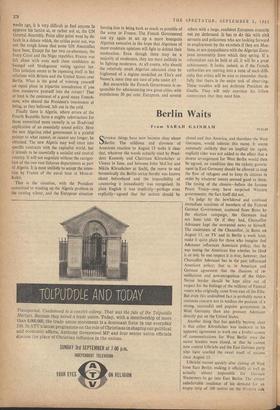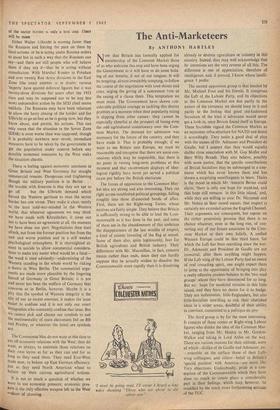Berlin Waits
From SARAH GAINHAM C EVE RAL things have now become clear about I./Berlin. The mildness and slowness of American reaction to August 13 make it clear that, whatever the words actually used by Presi- dent Kennedy and Chairman Khrushchev at Vienna in June, and between John McCloy and Nikita Khrushchev at Sochi, the move to seal hermetically the Berlin sector border was known about beforehand and the impossibility of countering it immediately was recognised. In plain English it was implicitly—perhaps even explicitly—agreed that the sectors should be closed and that America, and therefore the West Germans, would tolerate this move. It seems extremely unlikely that an implicit (or again, explicit) rider was not added to the effect that a decent arrangement for West Berlin would then be agreed, on condition that the rickety govern- ment in East Germany should be allowed to stop the flow of refugees and to keep its citizens in order by whatever means seemed good to them. The timing of the closure—before the famous Peace Treaty—may have surprised Western governments; the fact itself did not.
To judge by the bewildered and confused immediate reactions of members of the Federal German Government, scattered from Bonn by the election campaign, the Germans had not been told. Or if they had, Chancellor Adenauer kept the unwanted news to himself. The statements of the Chancellor, in Bonn on August 13, on TV and in Berlin a week later, make it quite plain for those who imagine that Adenauer influences American policy, that he was toeing the American line whether he liked it or not. In one respect it is true, however, that Chancellor Adenauer has in the past influenced American policy; that is, in American and German agreement that the illusions of re- unification and non-recognition of the Oder- Neisse border should be kept alive out of respect for the feelings of the millions'of Federal voters who originally came from east of the Elbe. But even this undoubted fact is probably more a common concern not to weaken the position of a strong, successful and popular government in West Germany than any pressure Adenauer directly put on the United States.
Another thing that has quickly become clear is that either Khrushchev was insincere in his apparent agreement to work out a livable. system of communications for . West Berlin once the sector borders were closed, or that he cannot now control Ulbricht and the East German party who have smelled the sweet smell of success since August 13.
Ulbricht moved quickly after closing off West from East Berlin, making it officially as well as actually almost impossible for German Westerners to go into East Berlin. The .tmost unbelievable insolence of his demand for an empty strip of 100 metres on the Weviorn side
of the sector border is only a first step. there will be more.
Either Walter Ulbricht is moving taster than the Russians and forcing the pace on them by local actions. or he is acting under Russian orders as usual but in such a way that the Russians can say—and there are still people who will believe them if they say it—that he is acting without consultation With Marshal K oniev in Potsdam and over twenty Red Army divisions in the East Zone (the exact number is in doubt; various `experts' have quoted ditlerent figures but it was twenty-three divisions for years after the 1953 riots and may be supposed not to be any less now) independent action by the SED chief seems unlikely. The Russians may have been reluctant to allow the hasty closing of the border and for Ulbricht to go as fast as he is going now, but they know about, and permit, his actions. This can only mean that the situation in the Soviet Zone (DDR) is even worse than was supposed; though it is probably nowhere near revolt, immediate measures have to be taken by the government to get the population under control before any possible economic measures by the West make the situation chaotic.
There is feeling against economic sanctions in Great Britain and West Germany for straight Commercial reasons. Dangerous and frightening though the military position is in Berlin . . the trouble with firearms is that they are apt to go oil . but the Ulbricht demand which forced the Western garrison to man the sector border has one virtue. They make it clear, surely to the least cold-war-minded in the Western world, that whatever agreement we may think We have made with Khrushchev, it turns out not to have been an agreement at all, the moment we have done our part. Negotiations then start afresh, not from the former position but from the new and worse position and in a still weaker Psychological atmosphere. It is shortsighted al- most to suicide to allow commercial considera- tions to make any easier what would be a fatal— the word is used advisedly—undermining of the Western standing in the whole world by risking a fiasco in West Berlin. The commercial argu- ments are made more plausible by the lingering hatred of Germany in Great Britain; it is not and never has been the welfare of Germany that concerns us in Berlin, however. Maybe it is a pity that the symbol of Western integrity is the City of our so recent enemies; it makes the issue easier to confuse and it is not only our overt antagonists who constantly confuse that issue. But we cannot pick and choose our symbols to suit the sentimentality of mass electorates fed on BB and Presley, or whatever the latest sex symbols are.
The Communist bloc do not want at this time to cut off economic relations with the West; they do want, as always, to maintain those relations on their own terms as far as they can and for as long as they need them. They need East-West trade now, to bolster up East German efficiency, just as they need North American wheat to bolster up their curious agricultural notions.
It is not so much a question of whether we want to use economic pressure; economic pres- sure is the only effective weapon left to the West '—short of shooting.



































 Previous page
Previous page